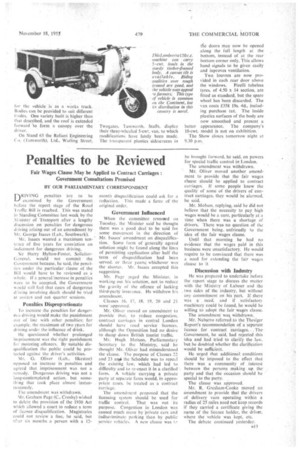Penalties to be Reviewed
Page 47

If you've noticed an error in this article please click here to report it so we can fix it.
Fair Wages Clause May be Applied to Contract Carriages : Government Consultations Promised
BY OUR PARLIAMENTARY CORRESPONDENT
DRIVING penalties are . to be examined by the Government. b.:fore the. report stage of the Road Traffic Bill is reached. This was stated' ii Standing Committee last week by the .Minister of Transport after a lengthy discussion on penalties for dangerous
• driving arising out of an amendment by Mr. George Isaacs (Lab., Southwark);
Mr. Isaacs wanted a maximum Sentence of five years for -conviction on indict ment for dangerous driving.. •
. Sir Harry Hylton-Foster, SolicitorGeneral, would not commit • the Government because, he said, the penalties under the. particular clause of the Bill would have to be reviewed as a whole. If a general increase in penalties Were to be accepted, the Government would still feel that eases of dangerous dHving involVing death should he tried at assizes and not quarter sessions.
Penalties Disproportionate
To increase the penalties: for dangerous driving Would make the pUnishment out of line with other .penalties; for example. the maximum of two years for driving under the influence of drink..
He questioned whether prolonged imprisonment was, the right punishment. for motoring offences. By -suitable disqualification the public could be protected against the ,driver's activities.
Mr. 0,Oliver (Lab., Ilkeston) opposed an increase in penalties and agreed that imprisonment was not a remedy. Dangerous driving was not a long-contemplated action, but . something that took place almost instantaneously.
The amendment was withdrawn.
Mr. Graham Page (C., Crosby) wished In delete the provision of the 1930 Act which allowed a court to reduce a term of licence disqualification. Magistrates could not review a fine, he •said, but after six months a person with a 12 :month disqualification could ask for a reduction. This made a' farce of the
original Order-.
Government Influenced When the committee resumed on Tuesday, the Minister said he thought there was a good d.cal to be said for . some movement in the direction of Mr. Isaacs' 'amendment on disqualification. Some form of generally agreed solution might he found along the lines' of permitting application after half the term of disqualification had been .served, or three years;i,. whichever was the shorter-. Mr, Banes . accepted this suggestion.
Mr. Page urged the Minister, in working out his solution, not to reduce 'the. gravity of the offence of lacking third-party insurance.. He withdrew his amendmen t.
Clauses 16, 17, .18, 19, 20 and 21 were 'approved. •
Mr. Oliver moved an amendment to provide that, to reduce . congestion, -contract carriages in central London should have road service 'licences, although the Opposition had no desire, to damp down British tourist traffic.
Mr. Hugh Nlolson, • Parliamentary _Secretary to the Ministry, said he thought Mr. Oliver had misunderstood the clause. The purpose of Clauses 22 and 23 MO the Schedule was to repeal the existing law, which: had led to difficulty and to re-enact it in a clarified form. A vehicle carrying a private party at separate fares Would, in appropriate cases. be treated as -a contract carriage.
The amendment proposed that the licensing system should be used for traffic control. That was not its purpose. Congestion in London was caused much more by 'private cars and indiscriminate parking than by public service vehicles. A new clause was to be brought forward, he said, on powers for special traffic control in London. The amendment was withdrawn.
Mr. Oliver moved another amendment to provide that the fair wages clause should be applied to contract carriages. If some people knew the quality of some of the drivers of contract carriages, they would be alarmed, he said.
Mr. Molson, replying, said he did not believe that the necessity to pay high wages would he a cure, particularly at a time when there was a shortage of drivers. 'There was no question of the Government being, unfriendly to the idea of the fair wages clause.
Until that morning he had no evidence that the wages paid in this business were unsatisfactory. He would require to be convincedthat there was a need for extending the fair wages clause to it.
Discussion with Industry
He was prepared to undertake before the report stage to discussthe matter with the Ministry of Labour and the two sides of the industry, but without any commitment on his part. If there was a need, and if satisfactory machinery could be found, he would be willing to adopt the fair .wages clause. . The amendment: was. withdrawn.,
Mr. Nabarro referrecKto the Thesiger Report's recommendation of a separate licence for contract carriages. _TheGovernment, he said, had rejected this idea and had tried • to clarify the law. -but,he doubted whether the clarification would be sufficient.
He urged that additional conditions should be imposed to the effect that there was a community of ,interest between 'the persons making up the: party and that the occasion should be special to the party.
The clause was approved.
Mr. R. Gresham-Cooke moved an amendment to provide that the drivers of delivery vans operating within a radius of 25 miles need not keep records if they carried a certificate giving the name of the licence holder, the driver, where the vehicle was kept, etc.
The debate continued yesterday.




































































































